英语副词用法总结(完整)
英语副词的用法大全

英语副词的用法大全副词在句中可用作:1)状语(这是副词在句子中的主要功用)It is raining hard.雨下得很大。
(副词hard作状语,修饰动词is raining。
) Don't drive too fast.车子不要开得太快。
(fast是副词,作状语,修饰动词drive,副词too又修饰副词fast。
)He speaks English quite well.他英语讲得相当好。
(well修饰动词speaks,quite又修饰副词well。
)This is a fairly useful tool,这是一件相当有用的工具。
(fairly修饰形容词useful)He has always helped his sister with her homework.他一向帮助他妹妹做家庭作业。
(always修饰动词has helped)She often went there.她常到那儿去。
(often和there均是副词,修饰动词went。
)Perhaps he will telephone later.也许他以后会打电话来的。
(perhaps 是副词,用以修饰全句。
)2)表语Is he up?他起床了没有?She is out.她出去了。
3)定语Life here is full of joy.这儿的生活充满了欢乐。
(here修饰名词life) 副词的位置1)修饰动词时,有三种位置。
2)修饰形容词和副词时,须放在被修饰词之前。
如:It is a rather difficult job,这是一件颇为困难的工作。
(rather修饰形容词difficult)He runs very fast.他跑得很快。
(very修饰副词fast)3)副词作定语时,一般放在被修饰的名词之后。
如:The peasants there are busy digging a canal now.那里的农民现在正忙于修水渠。
英语副词的用法总结
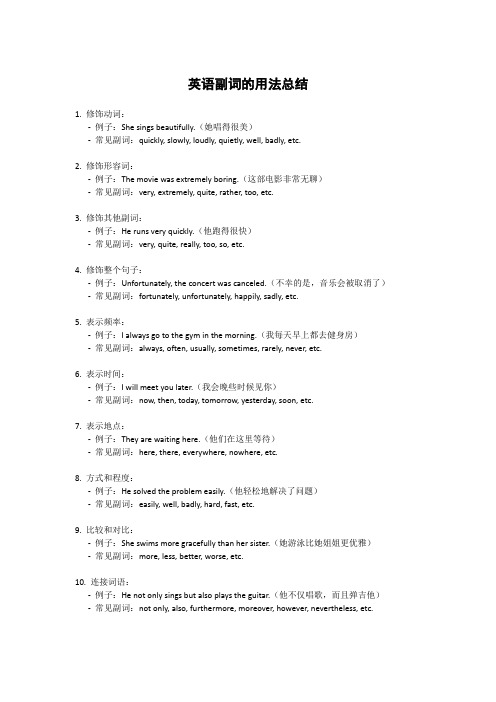
英语副词的用法总结1. 修饰动词:-例子:She sings beautifully.(她唱得很美)-常见副词:quickly, slowly, loudly, quietly, well, badly, etc.2. 修饰形容词:-例子:The movie was extremely boring.(这部电影非常无聊)-常见副词:very, extremely, quite, rather, too, etc.3. 修饰其他副词:-例子:He runs very quickly.(他跑得很快)-常见副词:very, quite, really, too, so, etc.4. 修饰整个句子:-例子:Unfortunately, the concert was canceled.(不幸的是,音乐会被取消了)-常见副词:fortunately, unfortunately, happily, sadly, etc.5. 表示频率:-例子:I always go to the gym in the morning.(我每天早上都去健身房)-常见副词:always, often, usually, sometimes, rarely, never, etc.6. 表示时间:-例子:I will meet you later.(我会晚些时候见你)-常见副词:now, then, today, tomorrow, yesterday, soon, etc.7. 表示地点:-例子:They are waiting here.(他们在这里等待)-常见副词:here, there, everywhere, nowhere, etc.8. 方式和程度:-例子:He solved the problem easily.(他轻松地解决了问题)-常见副词:easily, well, badly, hard, fast, etc.9. 比较和对比:-例子:She swims more gracefully than her sister.(她游泳比她姐姐更优雅)-常见副词:more, less, better, worse, etc.10. 连接词语:-例子:He not only sings but also plays the guitar.(他不仅唱歌,而且弹吉他)-常见副词:not only, also, furthermore, moreover, however, nevertheless, etc.。
(完整word版)英语中副词及用法
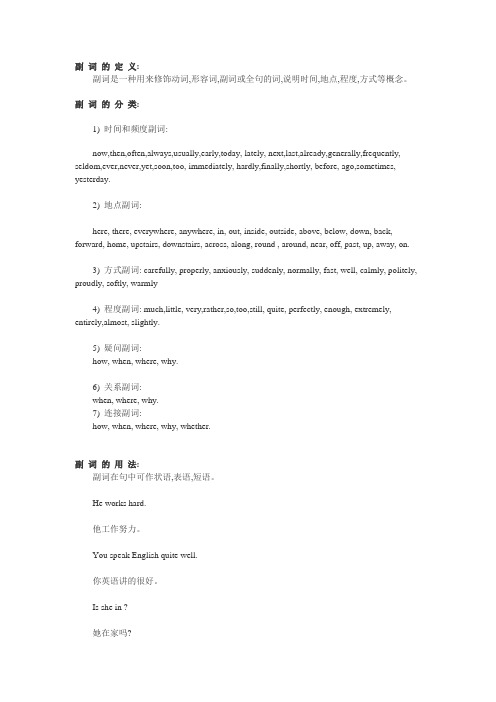
副词的定义:副词是一种用来修饰动词,形容词,副词或全句的词,说明时间,地点,程度,方式等概念。
副词的分类:1) 时间和频度副词:now,then,often,always,usually,early,today, lately, next,last,already,generally,frequently, seldom,ever,never,yet,soon,too, immediately, hardly,finally,shortly, before, ago,sometimes, yesterday.2) 地点副词:here, there, everywhere, anywhere, in, out, inside, outside, above, below, down, back, forward, home, upstairs, downstairs, across, along, round , around, near, off, past, up, away, on.3) 方式副词: carefully, properly, anxiously, suddenly, normally, fast, well, calmly, politely, proudly, softly, warmly4) 程度副词: much,little, very,rather,so,too,still, quite, perfectly, enough, extremely, entirely,almost, slightly.5) 疑问副词:how, when, where, why.6) 关系副词:when, where, why.7) 连接副词:how, when, where, why, whether.副词的用法:副词在句中可作状语,表语,短语。
He works hard.他工作努力。
副词的用法总结
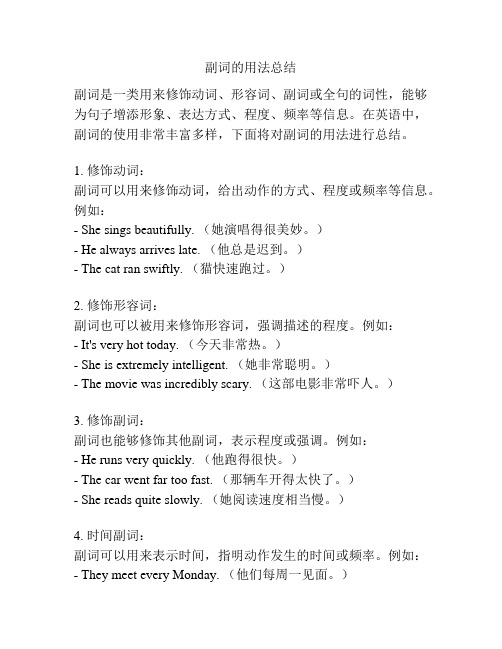
副词的用法总结副词是一类用来修饰动词、形容词、副词或全句的词性,能够为句子增添形象、表达方式、程度、频率等信息。
在英语中,副词的使用非常丰富多样,下面将对副词的用法进行总结。
1. 修饰动词:副词可以用来修饰动词,给出动作的方式、程度或频率等信息。
例如:- She sings beautifully. (她演唱得很美妙。
)- He always arrives late. (他总是迟到。
)- The cat ran swiftly. (猫快速跑过。
)2. 修饰形容词:副词也可以被用来修饰形容词,强调描述的程度。
例如:- It's very hot today. (今天非常热。
)- She is extremely intelligent. (她非常聪明。
)- The movie was incredibly scary. (这部电影非常吓人。
)3. 修饰副词:副词也能够修饰其他副词,表示程度或强调。
例如:- He runs very quickly. (他跑得很快。
)- The car went far too fast. (那辆车开得太快了。
)- She reads quite slowly. (她阅读速度相当慢。
)4. 时间副词:副词可以用来表示时间,指明动作发生的时间或频率。
例如:- They meet every Monday. (他们每周一见面。
)- I will do it later. (我会晚些时候去做。
)- She woke up early this morning. (她今早早醒来。
)5. 地点副词:副词可以用来表示地点或方向。
例如:- He lives nearby. (他住在附近。
)- The bird flew upwards. (鸟向上飞。
)- Please put it here. (请把它放在这里。
)6. 方式副词:副词还可以表示行为或动作的方式。
例如:- They walked quietly. (他们悄悄地走着。
高中英语知识点归纳副词短语的用法
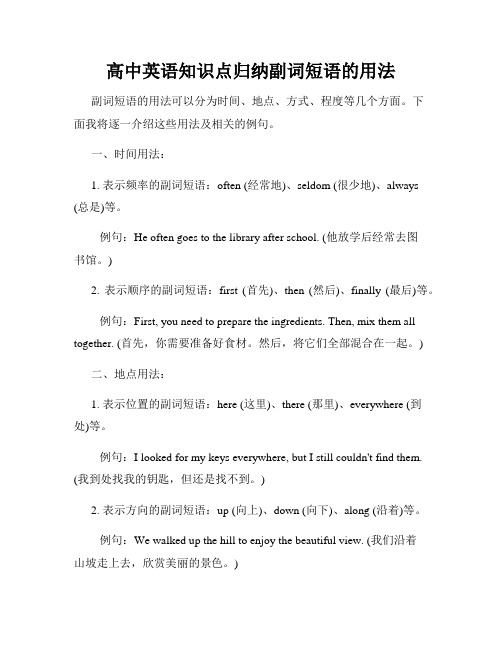
高中英语知识点归纳副词短语的用法副词短语的用法可以分为时间、地点、方式、程度等几个方面。
下面我将逐一介绍这些用法及相关的例句。
一、时间用法:1. 表示频率的副词短语:often (经常地)、seldom (很少地)、always (总是)等。
例句:He often goes to the library after school. (他放学后经常去图书馆。
)2. 表示顺序的副词短语:first (首先)、then (然后)、finally (最后)等。
例句:First, you need to prepare the ingredients. Then, mix them all together. (首先,你需要准备好食材。
然后,将它们全部混合在一起。
)二、地点用法:1. 表示位置的副词短语:here (这里)、there (那里)、everywhere (到处)等。
例句:I looked for my keys everywhere, but I still couldn't find them. (我到处找我的钥匙,但还是找不到。
)2. 表示方向的副词短语:up (向上)、down (向下)、along (沿着)等。
例句:We walked up the hill to enjoy the beautiful view. (我们沿着山坡走上去,欣赏美丽的景色。
)三、方式用法:1. 表示方式的副词短语:carefully (小心地)、quickly (快速地)、quietly (安静地)等。
例句:She spoke quietly so as not to wake the baby. (她小声说话,以免把孩子吵醒。
)2. 表示状态的副词短语:happily (快乐地)、sadly (悲伤地)、nervously (紧张地)等。
例句:The children jumped happily when they heard the good news. (孩子们在听到好消息时高兴地跳了起来。
英语中副词及用法规律总结
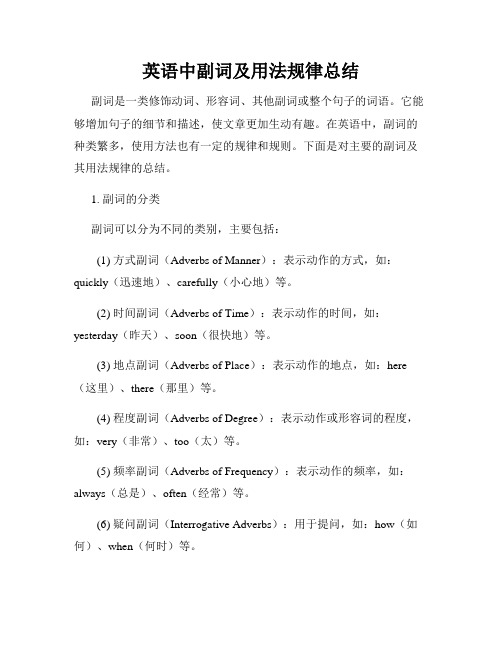
英语中副词及用法规律总结副词是一类修饰动词、形容词、其他副词或整个句子的词语。
它能够增加句子的细节和描述,使文章更加生动有趣。
在英语中,副词的种类繁多,使用方法也有一定的规律和规则。
下面是对主要的副词及其用法规律的总结。
1. 副词的分类副词可以分为不同的类别,主要包括:(1) 方式副词(Adverbs of Manner):表示动作的方式,如:quickly(迅速地)、carefully(小心地)等。
(2) 时间副词(Adverbs of Time):表示动作的时间,如:yesterday(昨天)、soon(很快地)等。
(3) 地点副词(Adverbs of Place):表示动作的地点,如:here (这里)、there(那里)等。
(4) 程度副词(Adverbs of Degree):表示动作或形容词的程度,如:very(非常)、too(太)等。
(5) 频率副词(Adverbs of Frequency):表示动作的频率,如:always(总是)、often(经常)等。
(6) 疑问副词(Interrogative Adverbs):用于提问,如:how(如何)、when(何时)等。
(7) 连接副词(Conjunctive Adverbs):用于连接句子,如:however(然而)、therefore(因此)等。
2. 副词的用法规律(1) 修饰动词:副词可以用来修饰动词,描述动作的方式、时间、地点等,如:He runs quickly(他跑得快)。
(2) 修饰形容词:副词可以用来修饰形容词,表示形容词的程度,如:It's very hot(非常热)。
(3) 修饰其他副词:副词可以用来修饰其他副词,表示程度、方式等,如:He speaks very fluently(他说得非常流利)。
(4) 修饰整个句子:副词可以用来修饰整个句子,表示说话者的观点、态度等,如:Certainly, I will help you(当然,我会帮助你)。
副词知识点用法总结归纳

副词知识点用法总结归纳一、副词的定义和分类1. 副词的定义:在英语中,副词是一种用来修饰动词、形容词、副词或整个句子的词类,用于表示时间、地点、方式、程度等含义。
2. 副词的分类:根据其所修饰的词类和表示的含义,副词可以分为以下几类:(1)时间副词:表示时间的副词,如now(现在)、today(今天)、yesterday(昨天)、soon(很快)、always(总是)等。
(2)地点副词:表示地点的副词,如here(这里)、there(那里)、above(在上面)、below(在下面)、everywhere(到处)等。
(3)方式副词:表示方式的副词,如quickly(快速地)、carefully(小心地)、easily(容易地)、well(好)等。
(4)程度副词:表示程度的副词,如very(非常)、extremely(极其)、rather(相当)、too(太)等。
(5)疑问副词:表示疑问的副词,如where(哪里)、when(什么时候)、how(怎样)、why(为什么)等。
二、副词的用法1. 修饰动词:副词可以用来修饰动词,表示动作的时间、地点、方式或程度。
例如:He runs quickly.(他跑得快。
)(修饰动词)2. 修饰形容词:副词可以用来修饰形容词,表示形容词描述的程度。
例如:She is very beautiful.(她非常漂亮。
)(修饰形容词)3. 修饰副词:副词可以用来修饰其他副词,表示副词描述的程度或方式。
例如:He speaks English quite fluently.(他的英语说得非常流利。
)(修饰副词)4. 修饰整个句子:副词可以用来修饰整个句子,表示说话人的态度、观点或希望。
例如:Hopefully, we will win the game.(希望我们能赢得比赛。
)(修饰整个句子)三、副词的比较级和最高级1. 比较级的构成:一般情况下,比较级的构成方式是在副词前面加上more或者在副词后面加上-er。
英语副词的用法总结
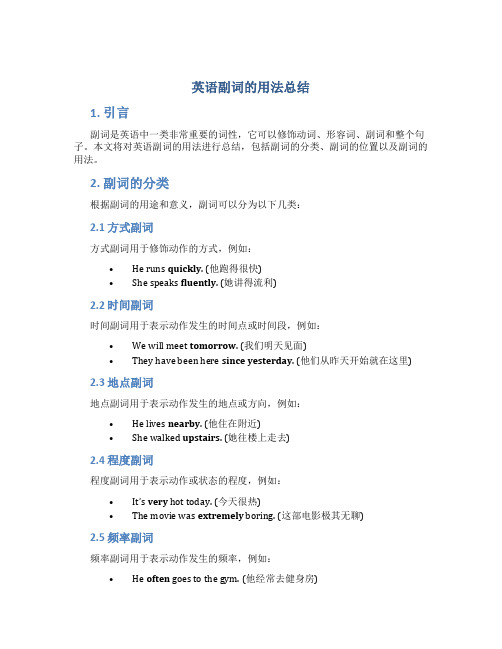
英语副词的用法总结1. 引言副词是英语中一类非常重要的词性,它可以修饰动词、形容词、副词和整个句子。
本文将对英语副词的用法进行总结,包括副词的分类、副词的位置以及副词的用法。
2. 副词的分类根据副词的用途和意义,副词可以分为以下几类:2.1 方式副词方式副词用于修饰动作的方式,例如:•He runs quickly. (他跑得很快)•She speaks fluently. (她讲得流利)2.2 时间副词时间副词用于表示动作发生的时间点或时间段,例如:•We will meet tomorrow. (我们明天见面)•They have been here since yesterday. (他们从昨天开始就在这里)2.3 地点副词地点副词用于表示动作发生的地点或方向,例如:•He lives nearby. (他住在附近)•She walked upstairs. (她往楼上走去)2.4 程度副词程度副词用于表示动作或状态的程度,例如:•It’s very hot today. (今天很热)•The movie was extremely boring. (这部电影极其无聊)2.5 频率副词频率副词用于表示动作发生的频率,例如:•He often goes to the gym. (他经常去健身房)•I rarely eat fast food. (我很少吃快餐)3. 副词的位置副词通常位于动词、形容词或其他副词之前,例如:•She quickly ate her breakfast. (她迅速地吃完早餐)•He is really tall. (他真的很高)但是有一些副词可以放在句首或句尾,例如:•Fortunately, he passed the exam. (幸运的是,他通过了考试)•I will go there tomorrow anyway. (无论如何,我明天会去那里)4. 副词的用法除了修饰动词、形容词和其他副词外,副词还有一些其他的用法:4.1 强调副词强调副词用于强调某个词或句子的重要性,例如:•He actually came to the party. (他居然来参加了派对)•She indeed knows a lot about art. (她确实懂很多艺术)4.2 连接副词连接副词用于连接两个句子或句子成分,例如:•I like coffee; however, I prefer tea. (我喜欢咖啡,然而,我更喜欢茶)•They didn’t win the game; instead, they lost. (他们没有赢得比赛,相反,他们输了)4.3 疑问副词疑问副词用于引导疑问句,例如:•Why is he late? (他为什么迟到了?)•Where did they go? (他们去了哪里?)5. 结论副词在英语中起着非常重要的作用,它可以丰富句子的意义,表达动作的方式、时间、地点、程度和频率等信息。
- 1、下载文档前请自行甄别文档内容的完整性,平台不提供额外的编辑、内容补充、找答案等附加服务。
- 2、"仅部分预览"的文档,不可在线预览部分如存在完整性等问题,可反馈申请退款(可完整预览的文档不适用该条件!)。
- 3、如文档侵犯您的权益,请联系客服反馈,我们会尽快为您处理(人工客服工作时间:9:00-18:30)。
英语副词用法总结(完整)一、单项选择副词1.What made them miss the deadline was not their lack of funding, but ________ their lack of planning.A.even B.stillC.rather D.ever【答案】C【解析】【详解】考查副词。
句意:使他们错过最后期限的不是缺少资金,而是缺少计划。
A. even甚至;B. still仍然;C. rather宁愿;D. ever曾经。
not...but rather表示“不是…相反而是…”,故选C。
2.The man should be excused because he caused the damage _______.A.deliberately B.unintentionallyC.meaningfully D.determinedly【答案】B【解析】句意为这个人应该被原谅,因为他是无意中造成了伤害。
故选unintentionally无意地。
3.— Do you often come here to have a walk?— No, only _________, because we are much too busy.A.occasionally B.eventuallyC.merely D.frequently【答案】A【解析】【详解】考查副词。
上句:你经常来这里散步吗?下句:不,只是偶尔,因为我们太忙。
A.occasionally偶尔;B. eventually最后;C. merely仅仅;D. frequently频繁地。
故选A。
4.While sending flowers as gifts, we can't choose flowers , because different flowers may carry different meanings.A.originally B.cautiously C.arbitrarily D.thoroughly【答案】C【解析】【详解】考查副词辨析。
A. originally最初;B. cautiously谨慎地;C. arbitrarily随意地;D. thoroughly 彻底地。
句意:在送花作为礼物的时候,我们不能随意选择花,因为不同的花可能有不同的含义。
故A选项正确。
5.________ he has not pleaded the guilty.A.So far B.AsC.Till far D.By far【答案】A【解析】【详解】考查So far的固定用法。
句意:到目前为止,他还没有认罪。
So far“到目前为止”,与现在完成时态连用,故选A。
6.--- How could you have trusted the online dictionary that much in translating your resume? --- Well, I never expected it should translate it so ______.A.literally B.originally C.sufficiently D.professionally【答案】A【解析】【详解】考查副词。
句意:---你怎么能这么信任在线词典帮你翻译简历呢? ---我从没想过它会这么照字面翻译。
A. literally照字面地;B. originally最初;C. sufficiently充分地;D. professionally 专业地。
结合句意可知答案为A。
7.Although she did not know Boston well, she made her way ________ to the Home Circle Building.A.easy enough B.enough easyC.easily enough D.enough easily【答案】C【解析】试题解析:考查enough用法。
enough修饰形容词,副词需要后置,副词easily修饰动词made. 此题需要注意的是,此处的to为介词,结构为make one’s way to someplace表示去某地,而不是make+宾语+形容词+不定式的结构。
句意:尽管她不是很了解波士顿,可她却能轻易找到去家居建筑圈的路。
故选C。
考点:考查enough用法。
8.The college examination is ________________ easier this year than I have expected. A.fairly B.quiteC.rather D.very【答案】C【解析】试题分析:考查程度副词辨析。
fairly意为“相当,还算”,是这一组词中语气最轻的一个,只用于修饰褒义的形容词和副词;quite为“相当,或多或少地,在某种程度上”,语气比fairly稍强。
rather为“相当,有点,颇”,在这三个副词中语气最强。
且只有rather可以和比较级连用。
very语气最强。
句意:今年高考比我期望的还要简单很多。
故选C。
考点:考查程度副词辨析。
9.The task wasn’t easy, but we managed it __________.A.anyhow B.anyway C.somehow D.some way【答案】C【解析】略10.There is someone playing the guitar over there. Let's go and listen, shall we? Free entertainment, ________.A.anyway B.thoughC.therefore D.somehow【答案】A【解析】【详解】考查副词词义辨析。
句意:那边有人在弹吉他。
我们去听听,好吗?不管怎么说,这是免费的娱乐。
A. anyway不管怎么说;B. though尽管;C. therefore因此;D. somehow以某种方式。
anyway“不管怎么说”符合句意。
故选A项。
11.In a typical business situation, women, find themselves bumping their heads on "glass ceiling", a barrier to their career which may be impossible to breakA.as they might try B.try as they mightC.hardly as they try D.as they try very hard【答案】B【解析】【详解】考查部分倒装及副词辨析。
句意:在一个典型的商业环境中,虽然女性有可能努力尝试打破职场上的“玻璃天花板”,这是职场上的一道无法逾越的障碍。
hard为副词时“努力地,艰难地”,而“hardly”意为“几乎不”。
本句是说女性努力尝试打破这个障碍,所以不能用hardly,用hard。
分析句子可知,本句前后两句是转折关系。
当as译为“尽管”时,只用于倒装语序结构中,语气强于 although 和 though。
这种倒装常把副词置于as引导的从句的句首。
如Hard as he works, he can't support his family.尽管他工作努力,可还是无法养活一家人。
分析可知只有B项正确。
故选B。
12.The aim of education is to teach young people to think for themselves and not follow others ______ .A.blindly B.unwillingly C.closely D.carefully【答案】A【解析】【详解】考查副词词义辨析。
句意:教育的目的是教年轻人要独立思考而不是盲目地听从他人。
A.blindly盲目的;B.unwillingly不情愿地;C.closely紧密地;D.carefully仔细地。
与前面的think for themselves相对,故选A。
13.—What do you think of her suggestion?— ______ it would be much more sensible to talk about it later.A.Usually B.Generally C.Actually D.Exactly【答案】C【解析】【详解】考查副词词义辨析。
句意:——你觉得她的建议怎么样?——事实上,以后再讨论这个问题要明智得多。
A. Usually通常情况下;B. Generally大体上;C. Actually事实上; D. Exactly 精确地。
分析句意可知,此处应表示从事实情况来看,以后再讨论这个问题要明智得多。
故选C项。
14.The new machine, according to the report, will work twice as fast, ______ greatly reducing costs.A.so B.even C.yet D.thus【答案】D【解析】【分析】【详解】考查副词和连词辨析。
句意:根据报告,这台新机器,倍,因此可以极大地缩短成本。
A. so因此;B. even甚至;C. yet但是,然而;D. thus因此,从而。
根据前后两句的内容可知,前面的新机器工作效率是以前的两倍,导致后面的结果,so和thus都有“因此”之意,但so一般紧跟句子,而thus后常跟动词-ing形式。
本句空格后是动词的-ing形式作结果状语,因此要用thus。
故选D。
【点睛】1.thus和so都有“因此,如此”之意。
用作副词时,都可与and使连用,可互换。
用于并列句表“表顺承关系”,此时可互换。
It's all over now, and so you think no more of it.现在一切都过去了,别再去想它了He is the eldest son and thus heir to the title.他是长子,因此是头衔的继承人。
so 作副词时,常修饰形容词或其它的副词。
Don't look so angry.别那样怒气冲冲的。
2. so作连词时,可独立引导并列分句(分句前可用逗号或不用); thus前必须有分号(或破折号)隔开或与and连用。
才能引导并列分句。
She's not feeling well, so she wants to stay in bed.她感到不适,所以想卧床休息。
